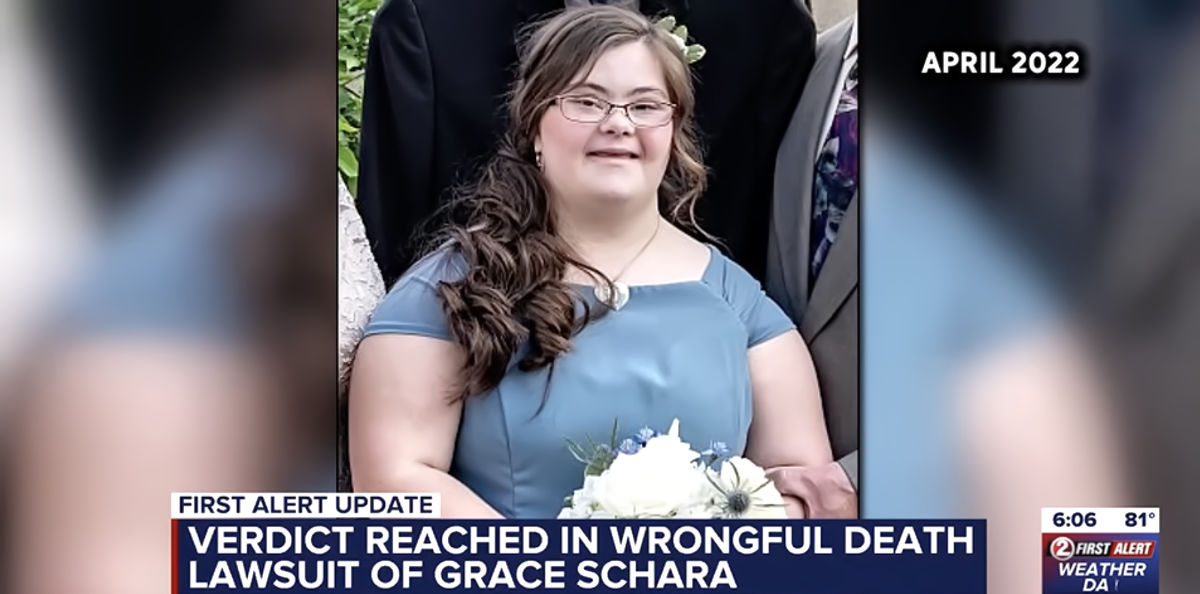A jury has ruled against the family of a young woman with Down syndrome who claimed she was intentionally killed by hospital staff during the COVID-19 pandemic.
Key Takeaways:
- In 2021, Grace Schara died at Ascension St. Elizabeth’s Hospital in Appleton, Wisconsin.
- Her family alleged she was given a do-not-resuscitate (DNR) order without their knowledge or consent, and that she had been fed a cocktail of drugs which led to her death.
- Afterwards, the Schara family sued, leading to a first-of-its-kind jury trial against the hospital.
The Backstory:
Grace, a 19-year-old woman with Down syndrome, caught COVID-19 in the midst of the pandemic. Though she had been doing well, when her oxygen levels dropped, her family took her to the hospital out of an abundance of caution.
Her father, Scott Schara, said staff repeatedly pressured him to ventilate Grace, and when he refused or questioned their orders, they forced him to leave the hospital. Her mother, Cindy, also had COVID-19, so she was not able to replace Scott as Grace’s advocate, which is required under the Americans with Disabilities Act (ADA). Her sister, Jessica Vander Heiden, was eventually approved as a replacement advocate.
The family claimed there was poor communication from then on.
“No doctor or nurse came to me and said anything they were doing,” Vander Heiden said. “I had to overhear what they were saying. They were just making decisions on their own, without even communicating with Grace’s power-of-attorney, which was my mother.”
According to the Schara family, hospital staffers began administering a dangerous cocktail of drugs. One, Precedex, is not meant to be given for longer than 24 hours. Grace had been receiving it for four days, with lorazepam and morphine added later.
“They gave Grace a combination of drugs that none of us could have survived,” Scott said.
Without the family’s knowledge or consent, Grace had been placed on DNR orders.
And while Vander Heiden was present, she noticed that Grace’s hands were growing cold. Later, she realized she couldn’t find a pulse, and that Grace’s eyes were rolling back in her head.
She, and her family, repeatedly begged the doctors and nurses present to help, but only then were the Scharas told that Grace had been labeled as DNR.
Vander Heiden, helpless, said dozens of nurses stood by and did nothing as Grace slowly died.
The Details:
The family sued the hospital in 2023. In Schara v. Ascension Health et al., the family claimed that five doctors illegally defied informed consent laws, and that they — along with two nurses — committed battery when Grace was killed.
In the press release announcing the lawsuit, it was called a first-of-its-kind trial; allegations against the hospital included battery. The press release said it was “the first time that doctors’ intentions come into play in this manner in a civil case.”
Tragically, the jury ruled against the Schara family, with the hospital claiming during the trial that nothing had been done wrong.
“This was standard, general ICU care in the management of these medications. If the plaintiffs had called anybody who had any experience titrating that, using this medication, they would know that,” Jason Frankowiak, an attorney for the hospital, claimed during the trial.
Hospital attorneys called medical experts, who testified the drugs given to Grace were normal standard of care in ICU settings. One of the doctors, Dr. Gavin Shokar, said he had two long conversations with Scott about placing Grace on a DNR, and that he was under the impression that the family had consented.
“Even if you somehow get the heart to restart, it will stop again,” Shokar said. “And you end up in this vicious cycle where you are just jamming on someone’s chest, breaking their ribs, causing trauma, until they die. I 100% believe it was consented to, given how extensive the conversations and the detail that went into those conversations.”
The Bottom Line:
Though the Schara family expressed their disappointment, they continued to focus on Grace and their faith in their post-trial statement.
“Personally, of course I’m disappointed,” Scott said. “But God knew this — he knew the verdict before we ever stepped one foot in this court. We know God’s will was done, even though we’re personally disappointed. My best buddy Grace, she would have said, which was perfect, ‘God did it, Dad.’ He did do it. We’re the first COVID case in the entire country that made it to jury trial.”








